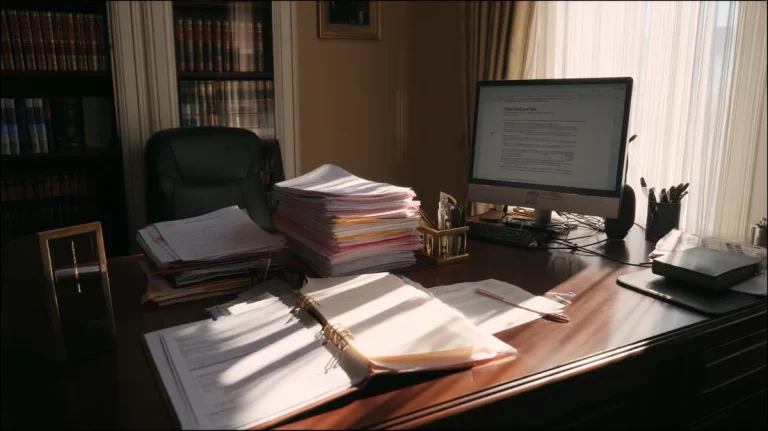Short answer: There isn’t one magic number.
Each state sets its own probate threshold, and the details change depending on the mix of assets, whether real estate is owned, and how the paperwork is handled.
So the quick rule of thumb is this: an estate has to be worth more than your state’s “small-estate” cap and include probate assets before the clerk will insist that you start the full legal process in probate court.
Everyone wants ways to avoid probate, but you can’t dodge it until you know the value of the estate and which assets are subject to probate.
Understanding Probate
“Probate” is simply the court-supervised legal process that transfers a loved one’s estate when they die.
The court appoints an executor (or personal representative) to inventory estate assets, pay debts, and hand the remaining assets to each beneficiary according to the will, or, if there is no will, according to state probate laws.
Formal probate protects creditors and heirs, but it can feel slow and expensive. Understanding probate means grasping why every estate is handled this way, when formal probate is required, and when a simplified probate process may be able to step in instead.
If the decedent left a solid estate plan, those items bypass probate entirely. Anything still titled solely in the decedent’s name, however, must go through the probate process. Some families learn that even tiny bank accounts trigger probate in their county, while others discover that their state lets a small estate slide through with a quick affidavit.
Probate administration can feel like deciphering unfamiliar rules while dealing with the loss itself.
Estate Value Thresholds by State
Probate rules read like fifty different playbooks, so the only way to know if an estate must go through probate is to check the exact state where the decedent lived.
For example, Nevada puts its small-estate rules right up front. Under NRS 146.080, an affidavit of entitlement lets heirs collect property without opening a formal case when the probate estate doesn’t exceed $25,000 or $100,000 if a surviving spouse is the sole claimant.
California lets successors use a simple affidavit when the estate’s gross value stays under $184,500 for deaths through March 31, 2025. Because the cap is indexed to inflation, it rises to $208,850 for deaths on or after April 1, 2025.
Texas uses a $75,000 ceiling, excluding the homestead and other exempt property, for its small-estate affidavit. Chapter 205 of the Texas Estates Code lays it out: if countable probate assets sit at or below that limit and creditors are covered, distributees can collect without letters of administration.
Taken together, these examples show why there is no one-size-fits-all rule: an estate’s value, the presence of real property, and the mix of probate assets decide whether the executor must open a formal probate case or can rely on a simplified procedure instead.
Types of Property That May Avoid Probate
Every estate has to go through some type of probate, but certain assets slide outside the formal probate process.
Jointly Owned Property
Homes held as joint tenancy or tenancy by the entirety pass to the survivor automatically. Because title shifts by law, the property is not a probate asset even when the estate’s value is high.
Assets with Named Beneficiaries
Retirement funds, payable-on-death accounts, and life insurance policies pay straight to the named beneficiary. The executor lists them for tax purposes, yet they don’t count toward the probate threshold.
Living Trusts
When a person creates a living trust and transfers assets into it, the trust owns those items. They stay outside probate court supervision, and the successor trustee distributes them privately. A well-funded trust is one of the classic ways to avoid probate.
Small Estate Affidavits and Simplified Procedures
A small estate affidavit is the paperwork shortcut states offer for estates worth less than their threshold for probate.
When the estate qualifies for simplified probate process rules, heirs can collect accounts and transfer title without opening full probate. Estates worth less than the cap still need careful estate administration. Creditors must be paid first, but the court’s role is minimal.
To use a small estate affidavit, the executor (or whoever steps in when no executor was named) files the form with supporting documents. The bank or title company then releases the funds or changes ownership. Filing a small estate affidavit can save months, maybe years, and thousands in fees.
Choosing this route helps you avoid probate court entirely and keep more money in the beneficiary’s pocket.
How to Estimate the Value of an Estate
Figuring out how much an estate is worth starts with separating countable from non-countable property.
Countable vs. Non-Countable Assets
Countable assets include checking and savings balances, investment accounts, vehicles, collections, and real estate owned solely by the decedent.
Non-countable assets typically include joint accounts that pass to the survivor, retirement accounts with beneficiaries, and any property in a living trust.
Debts and Liabilities
The estate’s value is calculated gross. Debts come out later, so a mortgage balance does not shrink the value of the estate when deciding whether you must file probate.
Estate taxes may apply if the estate is very large, but those calculations happen during the process of settling an estate.
Appraisals and Documentation
When estate assets include real estate or unusual collectibles, an appraisal pins down how much the estate is valued at.
Gather deeds, titles, account statements, and any life insurance policies right away so you can decide whether the estate needs full probate or might qualify for simplified probate. Accurate records also make it possible to avoid probate delays.
When to Consult an Attorney
Dealing with probate is stressful.
An experienced estate planning lawyer or experienced probate lawyer knows every type of probate in your county, understands local probate laws, and spots snags before they cost money. A probate attorney can help create an estate plan, prepare your estate documents, and file probate when necessary. An attorney can help even if you think the estate may be able to use a small estate affidavit.
If the estate includes real estate in multiple states, valuable business interests, or disputes among heirs, hiring an estate planning law firm is smart.
Final Thoughts on Probate Thresholds
Every estate is unique. Estate planning attorneys preach that the value of the estate, the types of assets, and family dynamics decide whether the estate must go through probate.
Some estates worth less than five figures still face a full probate process because they include real estate or lack clear beneficiary designations. Other families with estate assets well over six figures sail through a simplified probate process because the decedent funded a living trust and kept beneficiary forms up to date.
The lesson is to create an estate plan now so your executor can file a small estate affidavit or qualify for simplified probate when possible.
FAQ’s About Probate Thresholds
Each legislature sets its own probate threshold in dollars and defines which assets are subject to probate.
You can avoid probate with living trusts, transfer-on-death deeds, and beneficiary designations. However, some assets still require court oversight, so an experienced probate lawyer can map out what must pass through the system.
Probate happens in court under a judge’s eye while trust administration is handled privately by a trustee. Both involve distributing assets, but trust work usually stays out of public view unless trust disputes trigger litigation.
The court can remove the executor, order repayment, or impose personal liability for losses. Beneficiaries file petitions to prove misconduct and may seek a new personal representative.
Yes. Statistics cited by the American Bar Association show settlement rates approaching 80 percent, saving legal fees and emotional wear and tear.






